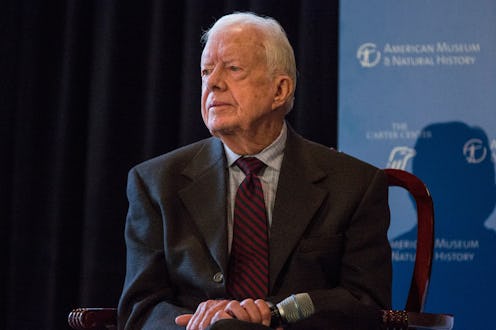News
How Jimmy Carter Redefined The Post-Presidency
It's said that an American president starts thinking and planning about how to get reelected almost immediately after winning the job. In the modern era, a single-term presidency, unless it's by the candidate's choice not to run again, is usually viewed as a failure on some level, and leads to speculation about what might have been. But Jimmy Carter's work after his presidency redefined the role of a former president, accomplishing more in the 35 years since he left office than he did in his four as Leader of the Free World.
Carter ruminated on his post-presidency during a press conference Thursday, when he announced he would receive treatment for brain cancer. While there were some things he said he wished he had done differently, it seemed he had few actual regrets.
"My life since the White House has been personally more gratifying, although the presidency was obviously the pinnacle of political success. If I had to choose between four more years and the Carter Center, I think I would choose the Carter Center." Ideally of course, Carter said, he would have liked to do both.
It isn't easy to win reelection to the Oval Office; President Obama is one of only 16 presidents to be elected to two consecutive terms (good trivia question: Grover Cleveland was the only president to serve two non-consecutive terms). Five previous presidents died during their first terms, and seven sitting presidents decided not to seek reelection.
Of the four living former presidents, it was Carter who provided the model for how to use post-presidential status for good works. He set up the human rights-oriented Carter Center in 1982, monitoring elections in more than 100 countries and working to help eradicate disease in Africa. Carter and his wife, Rosalynn, are also known for their years of work with Habitat for Humanity.
In 2002, Carter was the first former president to win the Nobel Peace Prize "for his decades of untiring effort to find peaceful solutions to international conflicts, to advance democracy and human rights, and to promote economic and social development."
But in his memoir released last month, A Full Life, Reflections at Ninety, Carter wrote that he actually had no idea what he was going to do when he lost his re-election bid. He was only 56 at the time (which, interestingly is a year older than Obama will be when he leaves the White House), and eventually decided he didn't want to just build a presidential library, as is customary, or play golf, but to try to make the world a better place.
Much like Carter before them, former presidents George H.W. Bush and Bill Clinton have taken up the mantle of humanitarian causes. Before he left office in 2001, Bill Clinton said he wanted to model his post-presidential career after Carter's. Bush, who is a year older than Carter and has had his own share of health woes recently, tweeted his support for Carter on Thursday.
Since Carter has been arguably the most impressive former president the United States has yet to see, there is little doubt that despite the serious battle Carter has ahead of him, he is more than up to the challenge. It would not be the first time Jimmy Carter has surprised his observers and done something unexpected.
